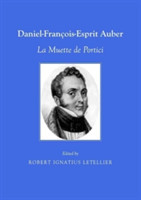Daniel-François-Esprit Auber (1782–1871), the most amiable French composer of the 19th century, came to his abilities late in life. After a stalled commercial career, he studied with Cherubini. His first works were not a success, but La Bergère Châteleine (1820), written at the age of 38, established him as an operatic composer. He then met the librettist Eugène Scribe (1791–1861), with whom he developed a working partnership, one of the most successful in musical history, that lasted until Scribe’s death. After Le Maçon (1825) and La Muette de Portici (1828), Auber’s life was filled with success. In 1829 he was appointed a member of the Institut, in 1839 Director of Concerts at Court, in 1842 Director of the Conservatoire, in 1852 Musical Director of the Imperial Chapel, and in 1861 Grand Officer of the Légion d’Honneur.Auber’s famous historical grand opera La Muette de Portici (also known by its hero’s name as Masaniello) is a key work in operatic history. Auber himself experienced four French Revolutions (1789, 1830, 1848, 1870). The latter (The Commune) hastened the end of his life. He died on 12 May 1871, at the advanced old age of 89, and in the pitiful conditions of civil strife, after a long and painful illness which worsened during the Siege of Paris. He had refused to leave the city he had always loved despite the dangers and privation, even after his house had been set on fire by the petroleurs et petroleuses. By some irony a mark had been placed against the house of the composer of Masaniello, the very voice of Romantic liberty!Auber’s overtures were once known everywhere, a staple of the light Classical repertoire. The influence of his gracious melodies and dance rhythms on piano and instrumental music, and on the genre of Romantic comic opera, especially in Germany, was overwhelming. The operas themselves, apart from Fra Diavolo (1830), have virtually passed out of the repertoire, since Auber’s elegant and restrained art now has little appeal for the world of music, attuned as it is to the meatier substance of verismo, Wagnerian transcendentalism, and 20th-century experimentalism.La Muette de Portici, an opera in five acts, with libretto by Eugène Scribe and Germain Delavigne, was premiered at the Académie Royale de Musique (Salle de la rue Le Peletier) on 29 February 1828. The setting is Naples in 1647, against the historical background of the revolt led by the fisherman Tommaso Aniello (Masaniello) against Spanish rule.This work, of crucial importance for the genre of grand-opéra, or grandiose historical music drama, was one of the most successful of the 19th century, and became enveloped in a revolutionary mystique. This reputation took fire following a performance in Brussels on 25 August 1830 which sparked the uprising for Belgian independence from the Netherlands, and was further sustained by the events of 1848 when stagings of the opera caused tumult and demonstrations in several opera houses.La Muette de Portici is the first grand-opéra with all the typical characteristics of the genre: five short acts, most of which culminate in a dramatic and decorative tableau; ballets loosely connected with the action (in acts 1 and 3); stage sensation and mass groupings, with lavish use of décor, costumes and machinery (the wedding procession, the busy marketplace and popular uprising, the eruption of Vesuvius), characteristic situations and their appropriate type of aria. There is a group of important leading roles, powerful and functional choruses, and a much expanded reliance on the orchestra.The music responds to, and reflects, the vivid and imposing scenic effects (based on historical and pictorial research by the great stage designers and painters Pierre-Luc-Charles Cicéri and Louis-Jacques-Mandé Daguerre). The music is also remarkable for its melodic abundance, the excitement of its ensembles, the verve of its dances, and the power and variety of the choruses.The contrast between the two heroines—Fenella, a mute peasant who expresses herself in gesture and dance in free-form balletic sequence; and Elvire, a glamorous princess who uses the full range of Italianate vocal genres and styles—makes a series of innate dramatic and symbolic points about power and powerlessness, authenticity of emotion, and the nature of commitment. The two tenor roles have a similarly strong, if less vivid, contrast. The prince, Alphonse, comes across as weak and vacillating, whereas Masaniello, the fisherman, is a natural leader, a man among men, whose devotion to his people, to freedom, as well as to his pathetic broken sister, mark him out as hero.The roles were created by Adolphe Nourrit (Masaniello); Alexis Dupont (Alphonse); Laure Cinti-Damoreau (Elvire); Henri-Bernard Dabadie (Pietro) and Prévot (Borella); with Pouilley, Jean-Etienne-Auguste Massol, Ferdinand Prévot and Mlle Lorotte. The dancer Lise Noblet realized the role of Fenella. The opera was one of the greatest successes at the Paris Opéra, the 100th performance taking place on the 23 April 1840, the 500th on 14 June 1880. It was also successful in other countries, especially Germany. The work was translated into German, Hungarian, English, Italian, Czech, Dutch, Danish, Polish, Norwegian, Swedish, Croatian and Russian.This edition reproduces the vocal score published by E. Troupenas (c. 1828).



















